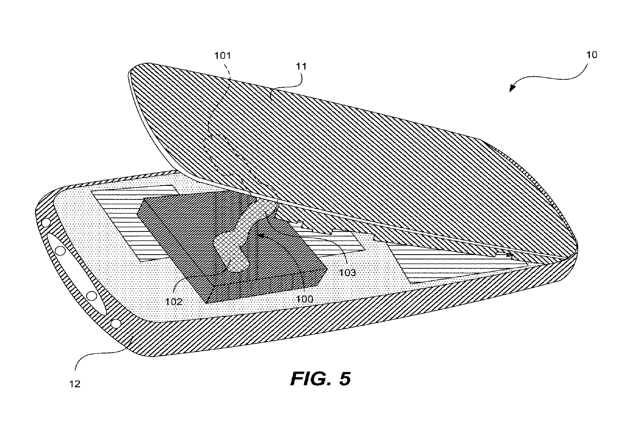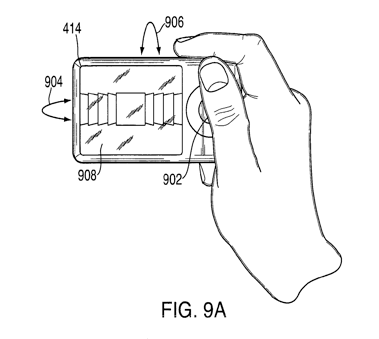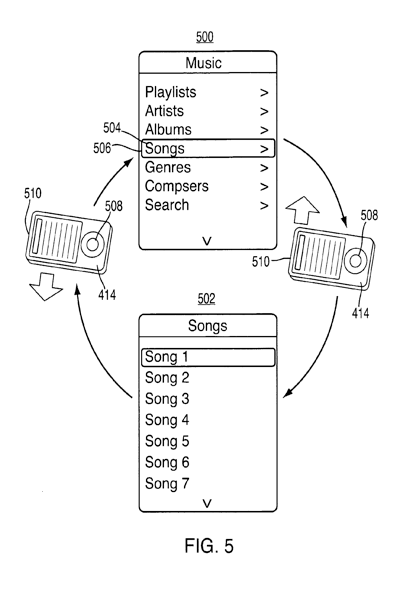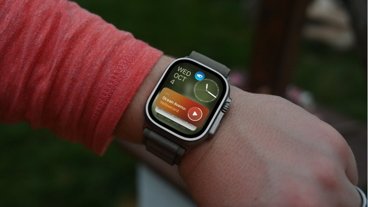Tamper-resistant label detects device openings
Apple's patent application notes that it is in the best interest of an electronics manufacturer to be able to know when a device has been "compromised" and opened, thus voiding its warranty. Unauthorized tampering with an electronic device can destroy it, and without evidence of such tampering, a manufacturer may be obligated to support its warranty. Apple's technology, the company said, could save manufacturers "substantial costs."
"Unfortunately, many users nevertheless open their electronic devices to attempt to repair, reverse engineer or even hack various things within the device," the application reads. "Of course, one drawback to such unauthorized access is that one or more internal items may be destroyed or compromised, thus limiting the ability of the manufacturer or provider to provide effective servicing of the device."
The filing with the U.S. Patent and Trademark Office describes a specialized label that attaches to multiple locations inside of a device. Disassembling of the hardware would rip, damage or affect the label, which could then be detected by the manufacturer.
Such labels could be U-shaped or zigzagged, and could be made from paper, plastic, or a metallic foil.
"In the event that the user nevertheless does fully or substantially open the electronic device, then the label tears or otherwise becomes damaged," it reads. "Although such damage may be noticed by the user after opening the device, any repair or replacement of the torn or damaged label would ordinarily be difficult after the fact. In the event that the electronic device is ever exchanged, returned for repairs or otherwise provided back to the manufacturer or other authorized party, then the device can be checked to see if it has ever been opened since its initial issuance."
As they have become smaller and more advanced, Apple's portable devices in particular have become more and more difficult to disassemble. In its teardown of the new fifth-generation iPod nano, iFixit noted that the use of glue made the media player easy to put together, but difficult to take apart.
"We wish Apple would a little effort into making iPods repairable, instead of forcing people to throw them away when they break," the solutions provider said. "Recent iPods have become increasingly difficult to successfully repair."
iPod accelerometer controls
Apple could be bringing accelerometer controls to the iPhone, iPod touch, and potentially other iPods in the future, according to a new patent application.
Accelerometer control has already played a part in many games for the iPhone and iPod touch. Apple also introduced an accelerometer to the iPod nano in 2008, allowing users to rotate for cover flow view and shake to shuffle songs.
But the new patent application describes actively controlling the iPod media playback solely through the accelerometer, by moving and shaking the device. Users could scroll through songs, flip through the cover flow mode, and select content for playback all through physical motion.
"The physical stimuli can take any form, including an acceleration event, such as a flicking motion," the application reads. "The present invention can utilize an accelerometer to detect and measure the acceleration event, and even determine the direction and magnitude of the acceleration event."
 Neil Hughes
Neil Hughes









-m.jpg)






 Charles Martin
Charles Martin
 Malcolm Owen
Malcolm Owen

 Mike Wuerthele
Mike Wuerthele
 Christine McKee
Christine McKee


 Marko Zivkovic
Marko Zivkovic


-m.jpg)






43 Comments
It was introduced in the Nano in 2008, not 2004.
Understandable if people are shoving in unsupported 3rd party hardware into Apple hardware, and then turning around and demanding Apple take responsibility for any ensuing damage while still under warranty.
Seriously...
Just how much CONTROL does Apple feel they need to have over items purchased by consumers?
If someone buys a device and then decides to do whatever they choose with said item, it's their business, as well as their assumption of liability should something go awry.
Oh Apple.. You should just make the HD in the imac user upgradeable like the laptops.. then we won't have to open 'er up.
There have long been case sensors available for desktop PCs that sound an alarm if the case is opened. Why not develop a simple circuit or sensor that is disrupted when the ipod/iphone device is opened? Then the ipod/iphone could report any tampering on screen without having to even open the device to see if it was compromised.
If Apple really wants to be anal about it, they could even design the circuit to disable the device if an intrusion is detected.